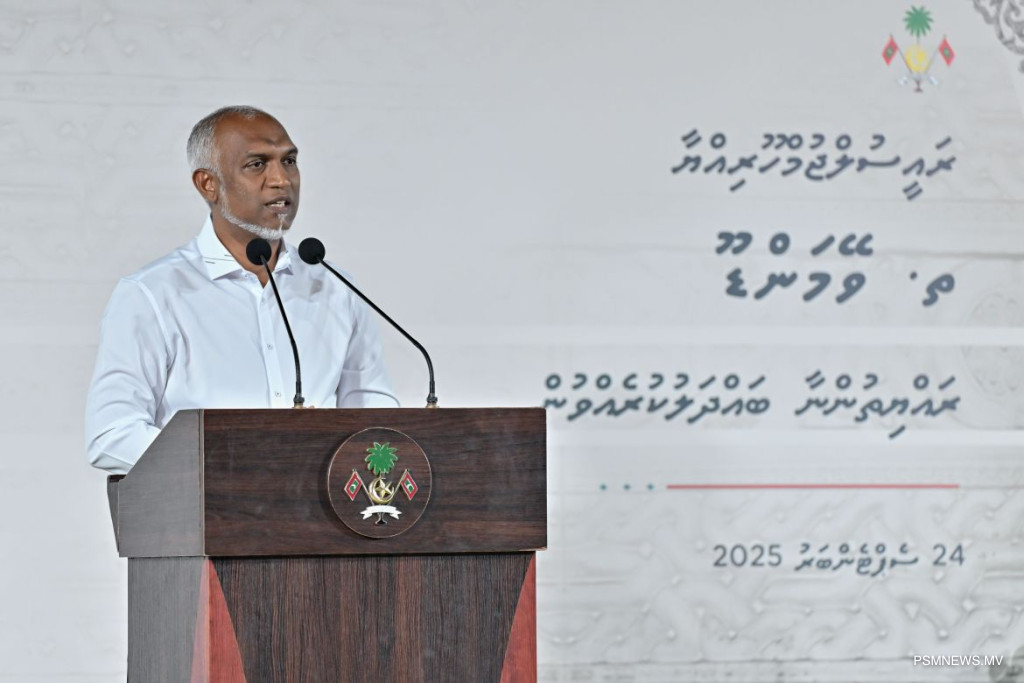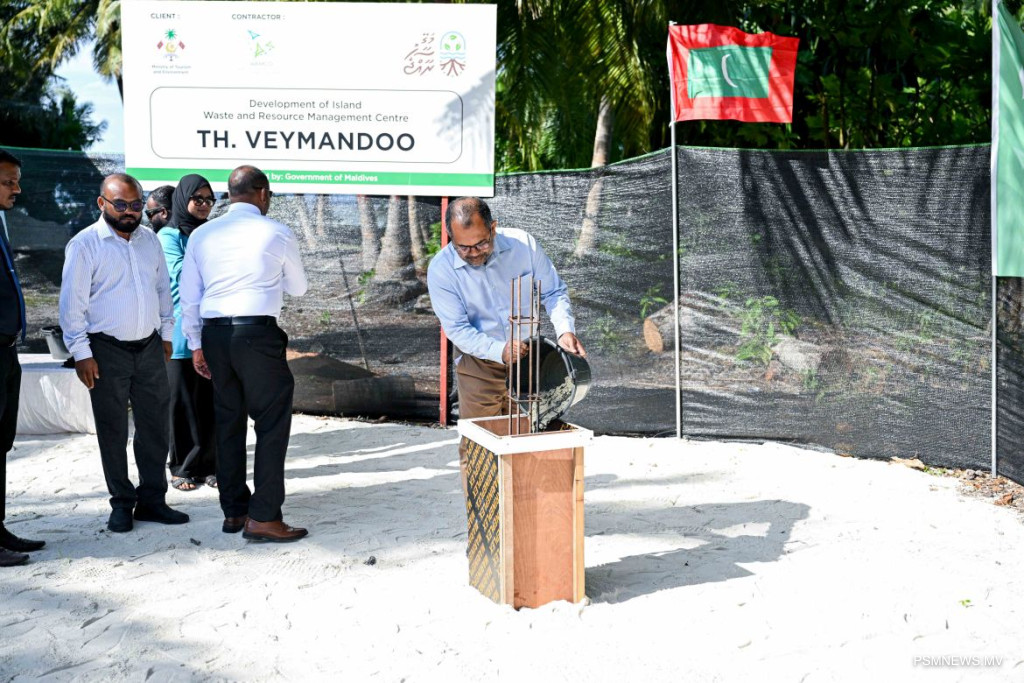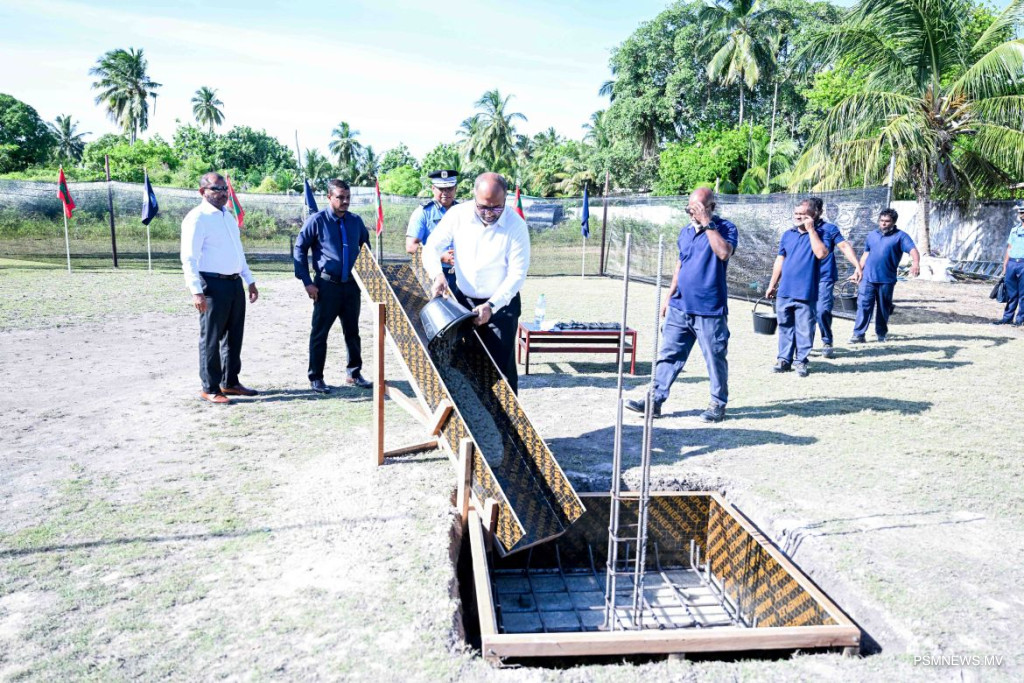In Veymandoo, President Muizzu presents blueprint for Islamic nation-building and regional growth

President Dr Mohamed Muizzu, during an official visit to Veymandoo in Thaa Atoll, outlined a national agenda that places Islamic advancement at the centre of his administration’s development strategy. Addressing residents of the island, he described the promotion of religious values as a foundational policy, essential to the country’s long-term progress.
Faith as the foundation of national identity
The president underscored that the unity and identity of the Maldivian people have been preserved through generations by adherence to Islamic principles. He cautioned that physical development, such as land reclamation and hospital construction, would be rendered meaningless if future generations were not anchored in their faith.
“If we allow our children to be drowned by the winds and currents of this world, then there is no point in reclaiming land, building hospitals, or accomplishing any number of other things here,” he said. “The journey hereafter is to the permanent abode. One can only go there by carrying the investments made in this life. That is not a monetary investment. It is an investment made in the heart.”
This spiritual investment, he added, is essential to realising the vision of a “100% Islamic nation”.
Government expands religious education and symbolism
To advance this goal, the government has launched a series of initiatives aimed at reinforcing religious education and symbolism. President Muizzu cited progress in training Huffaz, those who have memorised the Quran, and Khutaba, or preachers. He announced a target of 74 Huffaz by the upcoming Ramadan and noted that 500 young Khutaba have already been trained, with plans to double that number by the end of next year.
The administration is also introducing ‘Zikr boards’, featuring Islamic messages and guidance, along roads and in public spaces across all inhabited islands. In addition, Waqf buildings are being prioritised in urban centres to generate independent income for religious promotion. A Waqf building dedicated to the Quran is expected to begin construction shortly, and regional campuses of the Islamic University of Maldives are planned nationwide.

Quranic centres to be established across all inhabited islands
A central pillar of the president’s religious policy is the establishment of a branch of the National Centre for the Holy Quran on every inhabited island within his five-year term. These centres, he said, will be scaled according to each island’s population and are intended to institutionalise religious education across the country.
President Muizzu described the initiative as a fundamental responsibility of the government in its mission to uphold Islamic values and cultivate a virtuous society, an endeavour he regards as the true foundation of national strength.
Tourism and infrastructure to be developed in tandem
In a major announcement for the region, the president revealed that the Veymandoo-Kimbidhoo causeway will be developed as part of an integrated tourism initiative. Rather than proceeding as a conventional government-funded project, the administration is seeking a private developer to construct the causeway, traversing the uninhabited island of Elaa, as part of a broader tourism expansion strategy. He said this model would yield greater economic and individual benefits for the atoll.
To attract investment, the government has introduced a cross-subsidy framework and reduced land acquisition fees. In Thaa Atoll, the fee has been lowered from USD 250,000 to USD 75,000 per hectare, while other atolls will see a reduction to USD 200,000. Nine islands in Thaa Atoll have been designated for tourism development, with plans to replicate the model in five additional atolls.

Veymandoo to receive major infrastructure upgrades
Complementing the tourism initiative, the president announced a series of development projects for Veymandoo. These include 25 hectares of land reclamation, high-speed road construction, and the expansion and redevelopment of the island’s harbour.
Additional infrastructure includes a solar-powered, air-conditioned mosque with a capacity of 500 people; the completion of a multipurpose school hall and a three-storey building stalled for eight years; a new 50-bed hospital; and a state-of-the-art sports complex accommodating 1,200 spectators. The president also pledged that a psychiatrist, speech therapist, and physiotherapist would be appointed to the island within a week.
High-speed ferry service launched in Thaa Atoll
During the visit, President Muizzu inaugurated the Raajje Transport Link (RTL) high-speed ferry service in Thaa Atoll. Operated by the Maldives Transport and Contracting Company (MTCC), the service will connect all 13 inhabited islands in the atoll, expanding the RTL network to 94 islands across 12 atolls.
Thaa Atoll falls within Zone 4 of the national transport plan, which also encompasses Meemu, Faafu, Dhaalu, and Laamu atolls. The Japan International Cooperation Agency (JICA) is currently conducting a baseline survey to support the rollout of services in this zone. The president described the launch as a critical milestone in advancing both economic and individual development.


Agreements signed for land reclamation and road development
The government has formalised an agreement with MTCC for a land reclamation and harbour development project in Veymandoo. The contract was signed in the presence of President Muizzu, with Minister of Construction, Housing and Infrastructure Dr Abdulla Muththalib signing on behalf of the government and MTCC Managing Director Ahmed Saudee representing the company.
Under the agreement, 25 hectares of land will be reclaimed to alleviate land scarcity. The president assured residents that the project would be executed swiftly and without disruption. The harbour component includes expansion and redevelopment of existing infrastructure.

Road development project advances national infrastructure strategy
In a separate ceremony, the Veymandoo road development project was officially awarded to the Road Development Corporation (RDC). The agreement was signed by Minister Muththalib and RDC Managing Director Ibrahim Nazeem. The president affirmed that the project would proceed at high speed.
The initiative forms part of a broader national strategy to modernise road networks, with priority given to roads serving key institutions and those requiring urgent repair. Development will include modern features such as water drainage systems.

Waste management and policing projects break ground
The foundation stone for a new waste management centre in Veymandoo was laid as part of the president’s official itinerary. The ceremony was attended by Minister of Finance and Planning Moosa Zameer and Waste Management Corporation Limited (WAMCO) Managing Director Mujuthaba Jaleel.
The government has stated that the facility will offer a permanent solution to the island’s waste management challenges. The project is among several development initiatives being launched during the president’s tour of the atolls, which includes consultations with residents and updates on ongoing programmes.

Construction work has also begun on a new police station in Veymandoo. The project was commenced during a ceremony attended by President Muizzu and officiated by Minister of Homeland Security and Technology Ali Ihusaan.
The project aligns with the administration’s goal of establishing a police presence on every inhabited island within two years. The government believes this initiative will play a pivotal role in fostering a safe and secure society for all citizens.

Public reception underscores support for President Muizzu’s national tour
President Muizzu was met with a warm reception upon his arrival in Veymandoo, the administrative capital of Thaa Atoll. A large crowd, comprising heads of local institutions and members of the public, gathered to welcome him. Accompanying the president on his tour is a delegation that includes cabinet ministers and senior government officials.
